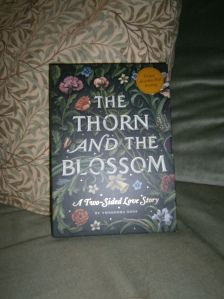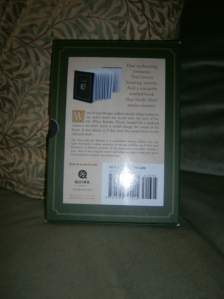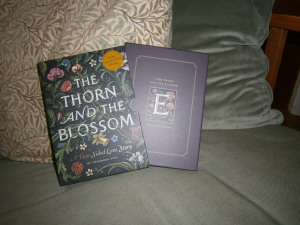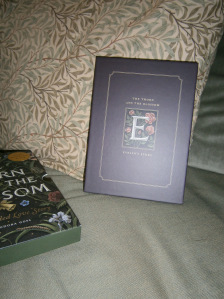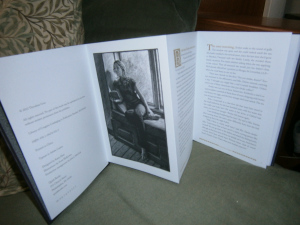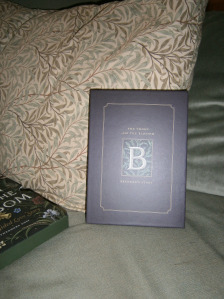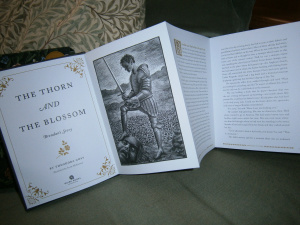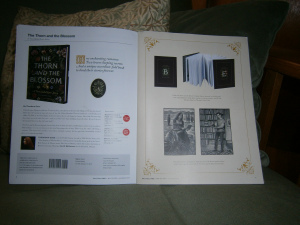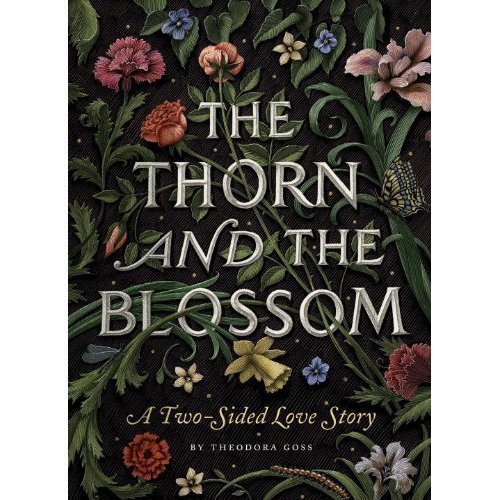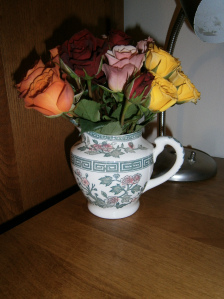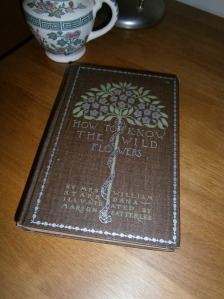Theodora Goss's Blog, page 48
October 23, 2011
The Book Itself
Guess what I got in the mail on Friday! Two copies of the book itself. Here is what it looks like (propped on my mission-style futon chair, against the William Morris pillow).
At least, that's the slipcase. If you turn it around, this is what the back looks like. The sticker can be removed. Under it, I've been told, is an image of a Green Man, but I don't want to remove the sticker. The book looks so pristine that I barely want to touch it.
Here's what it looks like when you pull the actual book out of the slipcase.
The first side you will see is Evelyn's story, but of course you can read either story first. At the beginning and end of each story are beautiful illustrations by Scott McKowan, who also illustrated the slipcase and the two covers.
Even though the book is arranged as an accordion, it's very easy to read. I pulled it apart here to show you how it works, but when you hold it in your hands, the pages turn as though it were an ordinary book.
And here is the other side, Brendan's story. The editor, Stephen Segal, and I have a disagreement about which story you should read first, Brendan's or Evelyn's. I think you should read Evelyn's first. Stephen thinks you should read Brendan's. But of course, you will have to decide for yourself.
I love this illustration. But I'm not going to tell you what it's an illustration of. That would give the story away.
And here it is in Quirk's spring catalog: a two-page spread! I can't wait for it to come out. I just hope people love the story, as much as I loved writing it.
Tomorrow, I'll tell you how I wrote it, because before it was a beautiful book, it was a feat of story engineering. Definitely the most challenging writing project I've ever undertaken, and I hope I've done a good job. But this book presented unique challenges. I'll tell you more about how I dealt with them, soon.
[image error]







October 21, 2011
Publicity
I've been thinking about publicity, for the obvious reason that it's time to start publicizing The Thorn and the Blossom.
I noticed two things today. The first thing I noticed is that Salman Rushdie is on Twitter. That struck me as strange enough that I wondered if it was, you know, the real Salman Rushdie tweeting. On the other hand, who else would tweet things like this:
"Congratulations to #JulianBarnes on winning the #Booker. Long overdue, my friend. Bravo."
"I'm happy to be going to support the beautiful, terror-stricken, and now reborn #TajHotel in Bombay at its NYC book launch tonight."
"All valuable literary methods are ways of revealing, amplifying, intensifying reality, not escaping from it."
That sounds like Salman Rushdie, doesn't it? What strikes me, though, is that he's the last writer in the world who needs publicity. I mean, doesn't everyone know who he is? After the fatwa that was issued against him, after he had to go into hiding for so long, I don't think he needs an introduction, exactly. And yet he has a beautiful website. And he tweets. It's clear that he cares about publicity.
The second thing I noticed is that Metaphorest has posted a YouTube video to introduce her debut album, which is available for pre-order.

One of the best known writers in the world and a brand new singer/songwriter. They both believe in the importance of publicity.
I do too, although the truth is that I'm an introvert, and sometimes it's difficult for me to do the sort of publicity I ought to. And sometimes I'm overwhelmed with work, as I am now. So it's difficult. But I'm going to try to do my best to publicize the book. And you know, if you'd like to help me, there will be opportunities. Since I posted about it, the book trailer is up to almost 200 views, and I'm sure we can do better than that! Let's start in November, after I come back from the World Fantasy Convention. And let's see how I do, how well I can publicize the book. I'm certainly going to try. (If Salman Rushdie can do publicity, well, I can certainly do it too, right?)
By the way, if you're going to be at the World Fantasy Convention, I'll have a copy with me. So if you'd like to look at it, come find me! I'll show it off to you. It really is gorgeous.








October 20, 2011
The Book Trailer
It's funny how things never really seem to stop happening.
On Friday I defended my dissertation, and I thought I would have some time to rest. But things keep appearing in my inbox, or popping up in places where I least expect. Like YouTube.
Would you like to see what I mean? Take a look at this:

You know what that is, don't you? It's the book trailer! For The Thorn and the Blossom! Which, in case you don't remember, looks like this:
The book looks gorgeous in the trailer, but I can tell you, having seen a copy, that it looks considerably more gorgeous in your hand. It's the sort of book you give your mother on her birthday, your girlfriend on Valentine's day. It's a romance and a mystery, and it's unlike anything else Quirk has done. I hope it finds a readership, because I really am proud of it.
Would you be interested in hearing more about how I wrote it? After all, it was almost a feat of engineering, writing two stories that fit together like puzzle pieces. I'll have to ask the publisher if I can talk about it, and when. But I think it would be interesting, for other writers and creative people in general, to hear about.
You know, nowadays we talk so much about changes in the publishing industry, and ebooks and building an author platform and all that business stuff. But what really matters, at least to me, is doing the projects that interest me, and that I think will be meaningful to readers. Because if I can't do that, nothing else really matters, you know?
I hope you like the trailer, and I hope you like the idea – and I hope that eventually, when it comes out in January, you will like the book.
Another thing that's popped up recently is that in April, I'll be at a literary festival in Arkansas. I'll give you details when I have them. So, Boskone in February, International Conference for the Fantastic in the Arts in March, the Arkansas literary festival in April, Wiscon in May. This is going to be a busy spring!





 [image error]
[image error]

October 19, 2011
The Gray Sectional
I sat down at the computer today, having no idea what I wanted to write about. My mind was almost completely blank. I'm still recovering from the dissertation, and it's been a long day. A long, gray, wet day. But I have some guilty pleasures, and one of them is looking at decorating websites. On one, Apartment Therapy, I found a post asking for advice. The poster wanted to find a gray sectional (that's a type of sofa) for around $2000. And my inner voice immediately said, are you joking? You're going to spend $2000 on a sofa?
I think when I was younger, I would have considered it all right to spend that sort of money on a sofa. At least, I wouldn't have questioned it. Society valued certain sofas at that price, and some people were willing to pay.
But now, I can't help it, I think there is something deeply distasteful about spending that sort of money. On a sofa. I think what happened, in part, was that my relationship with material goods changed. As I grew older (and I'm not, you know, all that old), it seemed increasingly silly to accumulate stuff. Or to decorate in the way everyone was supposed to decorate – a way that involved sectionals. (Which is an ugly word, isn't it?)
The older I get, the more what we do to follow social conventions seems silly. The more conventions themselves seem silly. (For example, the conventional way we decorate rooms.)
But there are two other reasons why it's a problem to spend $2000 on a sofa. First, if you spend that amount of money, what are you going to do to that sofa? Nothing, that's what. You're going to sit on it very carefully. You're not going to reupholster it. You're probably not even going to make pillows for it. You will instead buy pillows from some other expensive store. There will be nothing of you in that sofa except your money. And buying everything is a boring way to live. Second, there are so many things you could do with $2000. If I had that much money to spend on anything, I would probably publish a book, or create a video, or make something. Anything. But make, create. Go and commit art. (Or, if I couldn't think of anything else to do with it, donate it to a shelter for rescued cats.)
This has turned into a rant, hasn't it?
At this point, I may as well show you the offending beast:
Perhaps I wouldn't be so rant-y if it weren't monstrously sprawled in a rather pretty space. Like a whale in a drawing room. (Except that whales are considerably more attractive.)
I suppose over time I've developed an idea of how to live, which I would describe in these words: Live Small, Think Large.
If you live a fairly modest life, if you're thrifty, you can use your resources to create magnificent things, to make magnificent things happen. And you don't need to give up aesthetic pleasure. I'm not sure why, but in our culture, the most beautiful things are often also the cheapest. A chair in an antiques store. A peach from a farm stand.
There are things, material things, that are worth $2000. They are worth that amount of money because they are great works of art. Even certain sofas are worth that much. Just not this one.
Rather than buying a sofa like that, I would scatter pillows on the floor. And sit on them with friends, eating bread and cheese, drinking wine. Talking about the books we want to write . . .
[image error]
 [image error]
[image error]

 [image error]
[image error]


October 18, 2011
Metaphorest
Today, I have two songs for you, both from Metaphorest. I was listening to these yesterday.

(I like them both, but I think my favorite is the second one.)

I'm still thinking about what to do next. I suppose the reason I'm interested in these songs is that the singer seems new: her name is Sarah Daly, and her facebook page says that she's working on her debut album. I think it takes so much courage to be an artist. To put yourself out there, to tell the world that what you have to say is worth hearing. Because you're going to be rejected, criticized, ignored. We all are, sometimes. So I'm always interested in new artists like Daly. And I particularly like her sensibility. (And the name: meta-forest, metaphor-est.)
Which brings me back to the question of what to do next. I think that next on the agenda are the short story I owe an editor and the poetry collection. I will need time and space for those, particularly mental space. But I already know what the story is about – I've actually been waiting to write it for a while now.
I guess the question for me is, can I be a cool young artist like Metaphorest? (I think of myself as young.) Can I be innovative, can I create things that are dark and lovely and imaginative? I think I can . . . And somehow, I need to do more than just write. You know, write stories, send them out, have them published. I want to do more than that. I'm not exactly sure what yet. But now that the dissertation is done, I feel as though the the world is all before me. I think opportunities will come (they constantly seem to be coming), and I think I'll be able to do wonderful things. I can't wait to see what they are.
I'll leave you with Metaphorest's first video diary, which I think is a terrific way for her to publicize her songs.

 [image error]
[image error]


 [image error]
[image error]
 [image error]
[image error]
October 17, 2011
Now What?
On Friday, I successfully defended my doctoral dissertation. So, it's done. I still need to print out copies for the library, which will be an elaborate process. And I still need to fill out a few forms. But all the hard work is over.
Now what?
After the defense, after everyone had shaken my hand and said "Congratulations, Dr. Goss," I walked along the grassy strip behind the College of Arts and Sciences. It has a view of the river. There was a sort of mist in the air, falling – not rain exactly. But it was wet. I walked over the wet grass, looking at the river, feeling a curious blankness. For the last decade of my life, I have either been working on the dissertation or worried about not working on the dissertation (when I took time off, I mean).
And now, it's over. I feel as though the rest of my life is in front of me, and I have no idea what it's going to be like. I suppose it's up to me to create, at least partly.
On Saturday, I went to Concord and bought myself two things. The first is a green transferware pitcher with pink flowers. Here is it on my desk, with clustered roses in it:
And I bought myself a book called How to Know the Wild Flowers, by Mrs. William Starr Dana, published in 1899.
I thought they were good presents to myself, for successfully defending.
I do have some projects I need to work on. I've promised a short story to an editor. I have a poetry collection to compile. But I still feel curiously blank. I wonder if I will feel like that for a while. I'd like to have a sense of joy and purpose again. I'm not entirely sure where they'll come from. Perhaps they'll return by themselves?
It does feel good, at least, to post here again. I couldn't post for a while before the defense – I just didn't have the concentration. Perhaps that will return too.
I think what's happened is that I've gone through a liminal process. I've crossed a boundary and become something different from what I used to be. And now I'm not sure yet who I am. This is different from having finished the J.D. or M.A. Neither of those degrees were like this one. Perhaps part of the reason is that I'm now done with school. I will never be a student again. Even as I was graduating from law school, I knew I would be going back, pursuing a degree in English literature. Now, I can't imagine a reason I would go back for another degree. I'm done. And it's time to get to work, but I'm not sure who I am yet. And so, I'm not sure what work I need to do. (Writing, of course. But writing what? You see, it's not so simple.)
It may take me a while to find out.
[image error]
 [image error]
[image error]

 [image error]
[image error]
[image error]
[image error]

October 11, 2011
The Farmer's Market
"Where have you been?" you ask. Because I don't think I've updated this blog so intermittently since I first created it, in November. But I've never before been so close to my dissertation defense, either. So that's where I've been, preparing and just trying to keep up with daily life, which is particularly full of teaching right now. In a little while, I have to work on creating an assignment and planning for tomorrow. But I'm taking a few minutes to write something here, really anything, so I don't forget how. I feel almost as though I'm in danger of that.
Today was like all the days I've been having recently, in that almost nothing happened: I drove into the city to drop off some books with my first reader, and then I met with some students. And then I drove back. But on the drive back, I noticed that it was Farmer's Market day in Lexington. So I stopped by the market and walked around. There was produce, eggs, meat (lamb and fish), honey, breads and pastries of various sorts. I bought myself a plastic cup of apple cider and a multigrain bun with raisins. I also bought two whole-wheat pastries with raspberry jam filling for later, to share with Ophelia. And – I couldn't resist this – I bought a bunch of oyster mushrooms, all growing together, the loveliest gray, the most interesting shapes. What to do with them? I think I'll just sautée them with onions and put them on toast, so I can really taste them. There was something so calm, so right, about walking around among the booths, seeing the various things people had for sale. Some from real farms, some just from small businesses.
It made me think about the life I want to live. It doesn't involve going to the grocery store once a week and stuffing foods into an enormous refrigerator. It involves growing things, but also going to farmer's markets and buying things, bringing them back home, cooking. (I've missed cooking lately. There's no time to cook when you're finishing a doctoral dissertation.) It made me think, with nostalgia, of living in Europe, going to the small markets several times a week to buy bread, cheese, sausages, tomatoes. And of walking around Budapest, along the narrow streets, so many of which seem to have ice cream shops on them. (But Hungarian ice cream is completely different from American ice cream. It's more like gelato and comes in many more flavors.)
I think I'll eventually be able to create that life for myself. I just have to figure out how. And at the moment, I'm too tired even to think about it. But it was nice to stop by the farmer's market today, to walk around on the grass, drinking apple cider, looking at the honey soaps, the lavender creams, the hand-made pottery, the tiny eggplants and giant tomatoes.
Now, I'm going to get back to preparing. But I'm going to try to update this blog more regularly, even if I can't update it every day (for now). After all, I need to keep writing, simply to remind myself that I can, and I'm not doing much of it at the moment. So I might as well at least write here.
(And here, by the way, is a link to the Lexington Farmer's Market, in case you're ever in the area.)








October 5, 2011
On Poetry
Today I saw a blog post that Rosa Lemberg, the editor of Stone Telling, had written about The Moment of Change: An Anthology of Feminist Speculative Poetry, the poetry anthology she's editing. It will be coming out from Aqueduct Press. Here is the table of contents:
Ursula K. Le Guin, "Werewomen"
Nicole Kornher-Stace, "Harvest Season"
Eliza Victoria, "Prayer"
Shweta Narayan, "Cave-smell"
Theodora Goss, "The Witch"
Amal El-Mohtar, "On the Division of Labour"
J.C. Runolfson, "The Birth of Science Fiction"
Kristine Ong Muslim, "Resurrection of a Pin Doll"
Lawrence Schimel, "Kristallnacht"
Cassandra Phillips-Sears, "The Last Yangtze River Dolphin"
Peg Duthie, "The Stepsister"
Catherynne M. Valente, "The Girl with Two Skins"
Theodora Goss, "Binnorie"
Nandini Dhar, "Learning to Locate Colors in Grey: Kiran Talks About Her Brothers"
Rachel Manija Brown, "River of Silk"
JoSelle Vanderhooft, "The King's Daughters"
Lisa Bradley, "The Haunted Girl"
Mary Alexandra Agner, "Tertiary"
Sara Amis, "Owling"
Athena Andreadis, "Spacetime Geodesics"
Lisa Bradley, "In Defiance Of Sleek-Armed androids"
Sofía Rhei, "Cinderella"
Alex Dally MacFarlane, "Beautifully Mutilated, Instantly Antiquated"
Shweta Narayan, "Epiphyte"
Elizabeth R. McClellan, "Down Cycles"
H.E.L Gurney, "She Was"
Kelly Pflug-Back, "My Bones' Cracked Abacus"
Kat Dixon, "Nucleometry"
N. A'Yara Stein, "It's All In The Translation"
Sally Rosen Kindred, "Sabrina, Borne"
Adrienne J. Odasso, "The Hyacinth Girl"
Delia Sherman, "Snow White to the Prince"
Phyllis Gotlieb, "The Robot's Daughter"
Vandana Singh, "Syllables of Old Lore"
Greer Gilman, "She Undoes"
Emily Jiang, "Self-Portrait"
Ki Russel, "The Antlered Woman Responds"
Catherynne M. Valente, "The Oracle at Miami"
Athena Andreadis, "Night Patrol"
Koel Mukherjee, "Sita Reflects"
Lorraine Schoen, "Hypatia/Divided"
Sharon Mock, "Machine Dancer"
C.W. Johnson, "Towards a Feminist Algebra"
Jo Walton, "Blood Poem IV"
Meena Kandasamy, "Six Hours of Chastity"
Samantha Henderson, "Berry Cobbler"
Sofía Rhei, "Bluebeard Possibilities"
Sheree Renee Thomas, "Old Scratch poem featuring River"
Elizabeth R. McClellan, "The Sea Witch Talks Show Business"
Ranjani Murali, "Chants for Type: Skull-Cap Donner at Center-One Mall"
Sonya Taaffe, "Madonna of the Cave"
Jeannelle Ferreira, "Anniversaries"
Rebecca Korvo, "Handwork"
Patricia Monaghan, "Journey To The Mountains Of The Hag"
Ari Berk, "Pazerik Burial on the Ukok Plateau"
Neile Graham, "Dsonoqua Daughters"
Sonya Taaffe, "Matlacihuatl's Gift"
Ellen Wehle, "Once I No Longer Lived Here"
Yoon Ha Lee, "Art Lessons"
JT Stewart, "Say My Name"
Amal El-Mohtar, "Pieces"
Sofia Samatar, "The Year of Disasters"
Claire S. Cooney, "The Last Crone on the Moon"
Minal Hajratwala, "Archaeology of the Present"
Jennifer McGowan, "Mara Speaks"
JT Stewart, "Ceremony"
April Grant, "Trenchcoat"
Tara Barnett, "Star Reservation"
Mary Alexandra Agner, "Old Enough"
Nisi Shawl, "Transbluency: An Antiprojection Chant"
Doesn't that sound wonderful? And look, I have two poems in it!
I've had poetry on my mind recently, because it looks as though I'm going to be putting together a poetry collection. It will probably include quite a lot of unpublished poems, since most of the poems I've written over the years are unpublished. I'm so much more diffident about my poetry than about my prose. I feel as though I can call myself a short story writer, at least at this point. But can I call myself a poet? I don't know.
So I'm a little worried about putting together a collection: worried that people will read it and say, why does she thing she can write poetry? But you know, I make it a point to do things that scare me, like put my poetry out there. (Why does poetry seem so much more personal to me than prose? I'm not sure.)
So, just because I'm worried about my poetry, particularly the older stuff, I'm going to post, below, a poem I wrote back in 1993. (The year I graduated from law school. Maybe you can see a connection.) Here it is:
The Changeling's Story
I, fairy-spawn, am brought green and dripping
to the front doorsteps of the woodsman and his wife
who deserve much better, but are content with this
sign, they believe, of high favor. Ever after,
their astonishment is immense with I speak with weasels
and tease the hazels. It is moonlight
and skips in the frog-dew for me, and wild white things
only I see.
As I grow older, imagine my gold hair
which at the roots is green, and the grain of my white skin,
and my thin lips, how my blood is green.
A pair of sparrows nests behind my ears, indeed
I do not lack for jewels because berries
bend down to hang by my chin,
and the thistle plucks her thorns to nestle more closely
between my thumb and finger. You see, I remember,
in the chink of moneyed towns and walled-up gated gardens
and stone paths, my ancestry. I walk away from tea
tables and small cakes to stroke the yellow bee.
And you who listen to me, you with eyes closed and unbelieving
ears, and a mouth like a mole, what basket were you brought in?
Have you forgotten already the dances,
the wine drunk from acorn cups, the lean
ladies dragging farm boys into the waters, our sisters?
And our high pale mothers with wet glistening hands
holding closed sunflowers? And our proud
royal fathers hunting the lightning
with red-eared hounds that speak in human voices?
Cut your finger. See the ichor. How could you
have forgotten all of this?
It needs some revision (honestly: I've revised it a bit for this blog post). But once the defense is over, I'll be going through years of poetry, trying to separate the decent from the awful. We'll see what I find.








October 3, 2011
Deadlines and More Deadlines
I've been away from this blog for a while. But just a few minutes ago, I looked at the site stats and realized that this will be my 301st blog post. And that since I created it, this blog has received over 70,000 hits. I know, there are people who receive that number each day. But I'm so pleased with how this blog has done. After all, I created it in the midst of turmoil, and kept it up during one of the most tumultuous years of my life. Through finishing my dissertation and writing my first book (which will come out in January).
I'm still in the midst of the tumult, preparing for the dissertation defense. But soon that will be over as well.
And then I'll have a series of deadlines. My Folkroots column will be due, and I have a couple of short stories that I owe people. And it looks as though I'll be working on a poetry collection, which is something I've wanted to do for a long time. Honestly, I'm not sure my poetry is good enough to merit a collection, but other people seem to think it is, and I guess I'll leave that decision up to them. And I need to get back to the novel.
You remember the novel, right? The YA novel from the YA novel challenge. I never finished it, of course. Instead, I finished the dissertation, and that made sense at the time. The dissertation had to be completed. But there's more to the story than that. I learned something important this summer, while trying to finish the novel. It's that I can't write someone else's novel. I have to write my own. I'm not sure, now, if the idea I had for the novel really works. I'm not sure it's me, the way I write. I'm not sure it's the story I want to tell. And I'm not sure what to do about that. Start over? Maybe.
I have a feeling that I won't be able to work on the novel at all until I get some of the other projects I have out of the way – until I meet some of my deadlines. I certainly won't be able to work on it, or anything else, until after the defense. I have a feeling, or at least a hope, that once I'm finished with the defense, it will come to me. That the novel I'm supposed to write will start forming in my head. That's the way it usually happens, at least with stories.
So I have a column, stories, poems for the collection, and a novel to write. Honestly, I'll be glad to get back to it. I need writing, and I haven't been doing any of it lately, and that's not good for me.
Right now, it's deadlines all the way. But at least the projects I'm working on are ones I care about, ones that I think matter. Which is important because in the midst of turmoil, it gives me a feeling of purpose.








September 29, 2011
The White Witch
I know I haven't been posting regularly. It's because I'm so tired. Teaching and preparing for the dissertation seem to take all my time.
But I did find another "White Witch" poem. Here it is:
The White Witch
by Dora Sigerson Shorter
Heaven help your home to-night,
MacCormac; for I know
A white witch woman is your bride:
You married for your woe.
You thought her but a simple maid
That roamed the mountain-side;
She put the witch's glance on you,
And so became your bride.
But I have watched her close and long
And know her all too well;
I never churned before her glance
But evil luck befell.
Last week the cow beneath my hand
Gave out no milk at all;
I turned, and saw the pale-haired girl
Lean laughing by the wall.
"A little sup," she cried, "for me;
The day is hot and dry."
"Begone!" I said, "you witch's child,"
She laughed a loud good-bye.
And when the butter in the churn
Will never rise, I see
Beside the door the white witch girl
Has got her eyes on me.
At dawn to-day I met her out
Upon the mountain-side,
And all her slender finger-tips
Were each a crimson dyed.
Now I had gone to seek a lamb
The darkness sent astray:
Sore for a lamb the dawning winds
And sharp-beaked birds of prey.
But when I saw the white witch maid
With blood upon her gown,
I said, "I'm poorer by a lamb;
The witch has dragged it down."
And "Why is this, your hands so red
All in the early day?"
I seized her by the shoulder fair,
She pulled herself away.
"It is the raddle on my hands,
The raddle all so red,
For I have marked MacCormac's sheep
And little lambs," she said.
"And what is this upon your mouth
And on your cheek so white?"
"Oh, it is but the berries' stain";
She trembled in her fright.
"I swear it is no berries' stain,
Nor raddle all so red";
I laid my hands about her throat,
She shook me off, and fled.
I had not gone to follow her
A step upon the way,
When came I to my own lost lamb,
That dead and bloody lay.
"Come back," I cried, "you witch's child,
Come back and answer me:"
But no maid on the mountain-side
Could ever my eyes see.
I looked into the glowing east,
I looked into the south,
But did not see the slim young witch,
With crimson on her mouth.
Now, though I looked both well and long,
And saw no woman there,
Out from the bushes by my side
There crept a snow-white hare.
With knife in hand, I followed it
By ditch, by bog, by hill;
I said, "Your luck be in your feet,
For I shall do you ill.
I said, "Come, be you fox or hare,
Or be you mountain maid,
I'll cut the witch's heart from you,
For mischief you have made."
She laid her spells upon my path,
The brambles held and tore,
The pebbles slipped beneath my feet,
The briars wounded sore.
And then she vanished from my eyes
Beside MacCormac's farm,
I ran to catch her in the house
And keep the man from harm.
She stood with him beside the fire,
And when she saw my knife,
She flung herself upon his breast
And prayed he'd save her life.
"The woman is a witch," I cried,
"So cast her off from you";
"She'll be my wife to-day," he said,
"Be careful what you do!"
"The woman is a witch," I said;
He laughed both loud and long:
She laid her arms about his neck,
Her laugh was like a song.
"The woman is a witch," he mocked,
And laughed both long and loud;
She bent her head upon his breast,
Her hair was like a cloud.
I said, "See blood upon her mouth
And on each finger tip!"
He said, "I see a pretty maid,
A rose upon her lip."
He took her slender hand in his
To kiss the stain away –
Oh, well she cast her spell on him,
What could I do but pray?
"May heaven guard your house to-night!"
I whisper as I go,
"For you have won a witch for bride,
And married for your woe."
I haven't had time to answer the comments, but I think whoever said the White Witch is a version of the White Goddess, or the other way around, is right. So here is the White Goddess:
The White Goddess
by Robert Graves
All saints revile her, and all sober men
Ruled by the God Apollo's golden mean –
In scorn of which we sailed to find her
In distant regions likeliest to hold her
Whom we desired above all things to know,
Sister of the mirage and echo.
It was a virtue not to stay,
To go our headstrong and heroic way
Seeking her out at the volcano's head,
Among pack ice, or where the track had faded
Beyond the cavern of the seven sleepers:
Whose broad high brow was white as any leper's,
Whose eyes were blue, with rowan-berry lips,
With hair curled honey-coloured to white hips.
The sap of Spring in the young wood a-stir
Will celebrate with green the Mother,
And every song-bird shout awhile for her;
But we are gifted, even in November
Rawest of seasons, with so huge a sense
Of her nakedly worn magnificence
We forget cruelty and past betrayal,
Heedless of where the next bright bolt may fall.
I love the last stanza. To be perfectly honest, I think that in creating his White Witch, Lewis was mostly influenced by George MacDonald's Lilith, from his book of that name. Lilith was the first wife of Adam, who was cast out of Eden when she refused to be subject to him. She became a demoness, or at least that's how the story goes. Lewis' Jadis is of the line of Lilith, and is part jinn and part giantess, not human at all. The White Witch, in the first Narnia novel, isn't quite Jadis yet: Lewis has not yet created the character fully. By the time he introduces the Empress of Charn, she has become more beautiful, more sexual, more dangerous. I also wonder to what extent he was influenced by H. Rider Haggard's Ayesha, from the novel She? At one point, Ayasha also plans to conquer England, and she also has magical powers, as well as unending life.
Although this is not at all the book Lewis wrote, it almost seems to me as though Aslan and Jadis are opposites, principles in opposition, almost counterparts. If I were to write about them in some way, I think that's how I would do it.
I'm very tired, but there are things I need to start doing, just so my writing life does not go completely stagnant. Updating this website, for example. I'll try to do a little of that in the next few weeks, but mostly I'll be working, studying. I'll let you know when it's all over. And then, I'll be back.









